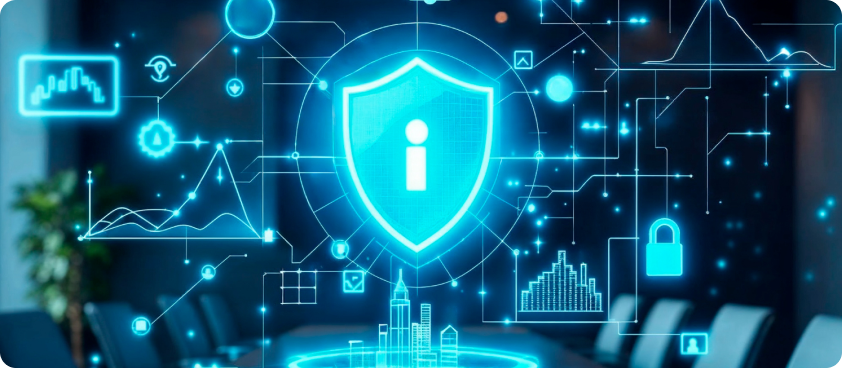Outsourced Expertise: The Benefits of Managed Cybersecurity Services
In today's interconnected digital world, cybersecurity concerns have become a top priority for businesses of all sizes. With the increasing frequency and sophistication of cyber attacks, organizations face a constant threat to their sensitive data, infrastructure, and operations.
- Aug 04, 2025

Introduction To Managed Cybersecurity Services
In today's interconnected digital world, cybersecurity concerns have become a top priority for businesses of all sizes. With the increasing frequency and sophistication of cyber attacks, organizations face a constant threat to their sensitive data, infrastructure, and operations. From data breaches to ransomware attacks, the consequences of inadequate cybersecurity measures can be severe, resulting in financial losses, reputational damage, and legal liabilities.
In response to these growing threats, many businesses are turning to managed cybersecurity services to bolster their defenses and protect their assets. Managed cybersecurity services offer a proactive approach to security management, leveraging advanced technologies, expert knowledge, and round-the-clock monitoring to detect and mitigate threats before they can cause harm. By outsourcing their cybersecurity needs to experienced professionals, organizations can gain peace of mind knowing that their digital assets are in safe hands.
In this article, we will delve into the world of managed cybersecurity services, exploring the various benefits they offer and why they are becoming an increasingly popular choice for businesses worldwide. From cost-effectiveness to access to expertise, we will examine how managed cybersecurity services can help businesses strengthen their security posture and mitigate the ever-present threat of cyber attacks.
Scope of Managed Cybersecurity Services
Managed cybersecurity services entail the delegation of cybersecurity responsibilities to external experts who possess the necessary skills, knowledge, and resources to ensure robust protection against a wide range of cyber threats. These services typically encompass various aspects of cybersecurity, including but not limited to:
Threat Monitoring: Continuous monitoring of networks, systems, and applications to detect and respond to potential security breaches and suspicious activities in real-time.
Incident Response: Rapid and effective response to security incidents, including containment, investigation, and remediation to minimize damage and restore normal operations.
Vulnerability Management: Identification and remediation of vulnerabilities within the organization's IT infrastructure through regular assessments, patch management, and security updates.
Compliance Management: Ensuring compliance with industry regulations, standards, and best practices to protect sensitive data and mitigate legal and regulatory risks.
Security Awareness Training: Educating employees about cybersecurity best practices, threats, and preventive measures to foster a culture of security awareness and mitigate human error risks.
How Managed Cybersecurity Services Work
Managed cybersecurity services operate through a collaborative partnership between the service provider and the client organization. The process typically involves the following steps:
Assessment and Planning: The service provider conducts an initial assessment of the client's cybersecurity needs, infrastructure, and risk profile. Based on the assessment findings, a customized cybersecurity strategy and implementation plan are developed to address the organization's specific requirements and objectives.
Deployment and Configuration: The service provider deploys and configures security tools, technologies, and protocols tailored to the client's environment. This may include implementing firewalls, intrusion detection systems, antivirus software, encryption solutions, and other security controls to mitigate risks and enhance protection.
Monitoring and Analysis: The service provider continuously monitors the client's network, systems, and applications for signs of suspicious activity, anomalies, or security breaches. Advanced threat detection technologies, behavioral analytics, and machine learning algorithms are leveraged to identify potential threats and vulnerabilities in real-time.
Incident Response and Remediation: In the event of a security incident or breach, the service provider initiates a rapid and coordinated response to contain the threat, investigate the root cause, and remediate the issue. Incident response plans, protocols, and escalation procedures are established to ensure timely and effective resolution while minimizing impact and downtime.
Continuous Improvement: Managed cybersecurity services are characterized by an ongoing process of improvement and optimization. The service provider conducts regular security assessments, audits, and reviews to identify areas for enhancement and refinement. Lessons learned from past incidents and emerging threat intelligence are incorporated to strengthen security posture and resilience over time.
Cost-Effectiveness of Managed Cybersecurity Services
One of the compelling reasons businesses opt for managed cybersecurity services is their cost-effectiveness compared to maintaining an in-house cybersecurity team. Let's delve into how managed services stack up against in-house teams in terms of cost and budgeting advantages.
Comparison with In-House Cybersecurity Teams
Maintaining an in-house cybersecurity team requires significant investment in hiring, training, salaries, benefits, and ongoing professional development. Recruiting and retaining skilled cybersecurity professionals can be challenging and costly, particularly in today's competitive job market where demand often outstrips supply.
On the other hand, outsourcing cybersecurity to managed service providers allows businesses to access a team of experienced professionals without the overhead costs associated with hiring and retaining full-time employees. Managed service providers employ a diverse team of cybersecurity experts with specialized skills and certifications, ensuring comprehensive protection against cyber threats.
Moreover, in-house teams may struggle to keep pace with the rapidly evolving threat landscape and technological advancements, leading to gaps in security coverage and effectiveness. Managed service providers, on the other hand, are dedicated to staying abreast of the latest trends, tools, and techniques in cybersecurity, ensuring that clients benefit from cutting-edge protection without the need for continuous investment in training and skill development.
Predictable Costs and Budgeting Advantages
Managed cybersecurity services offer predictable costs and budgeting advantages, making it easier for businesses to plan and allocate resources effectively. Unlike the variable costs associated with maintaining an in-house team, managed services typically operate on a subscription-based or fixed-fee model, providing clarity and transparency in pricing.
With managed services, businesses can forecast their cybersecurity expenses more accurately, eliminating the uncertainty and volatility often associated with in-house teams. This predictability enables organizations to allocate resources more efficiently, optimize their cybersecurity budget, and avoid unexpected expenses or budget overruns.
Furthermore, managed service agreements often include comprehensive service-level agreements (SLAs) that define the scope of services, performance metrics, and response times. These SLAs provide assurance to clients regarding the quality and reliability of the services they receive, ensuring that their cybersecurity needs are met consistently and effectively.
In summary, managed cybersecurity services offer a cost-effective alternative to in-house teams, providing access to a skilled and experienced workforce without the overhead costs and complexities of recruitment, training, and retention. Additionally, the predictable costs and budgeting advantages of managed services enable businesses to manage their cybersecurity expenses more efficiently and effectively, thereby enhancing their overall security posture and resilience.
Access to Expertise
Managed cybersecurity services provide businesses with access to a wealth of specialized knowledge and skills that may not be readily available in-house. Let's explore how these services offer expertise in cybersecurity and the benefits of round-the-clock monitoring and support.
Specialized Knowledge and Skills
Managed cybersecurity service providers employ a team of dedicated professionals with specialized expertise in various areas of cybersecurity. These professionals possess a deep understanding of the latest cyber threats, vulnerabilities, and attack vectors, allowing them to design and implement robust security measures tailored to the unique needs and challenges of each client.
From network security engineers to threat analysts and compliance experts, managed service providers offer a diverse range of skills and competencies to address the multifaceted nature of modern cybersecurity threats. By leveraging the collective knowledge and experience of their team members, businesses can benefit from comprehensive protection against a wide range of cyber risks.
Moreover, managed service providers often invest heavily in ongoing training and professional development for their staff to ensure they remain up-to-date with the latest technologies, tools, and best practices in cybersecurity. This commitment to continuous learning and skill enhancement enables managed service providers to stay ahead of emerging threats and provide clients with cutting-edge solutions and expertise.
Round-the-Clock Monitoring and Support
One of the key advantages of managed cybersecurity services is their ability to provide round-the-clock monitoring and support. Cyber threats can strike at any time, day or night, requiring continuous vigilance and rapid response to mitigate the impact and minimize downtime.
Managed service providers employ advanced monitoring tools, technologies, and methodologies to detect and respond to security incidents in real-time. Through 24/7 monitoring of networks, systems, and applications, they can identify and neutralize potential threats before they escalate into major security breaches.
Additionally, managed service providers offer round-the-clock support to address clients' security concerns and issues promptly. Whether it's troubleshooting technical problems, providing guidance on security best practices, or coordinating incident response efforts, their team of experts is available around the clock to assist clients and ensure their security needs are met.
By providing access to specialized expertise and round-the-clock monitoring and support, managed cybersecurity services enable businesses to enhance their security posture, mitigate cyber risks, and protect their valuable assets and data from evolving threats. With a dedicated team of professionals at their disposal, organizations can enjoy peace of mind knowing that their cybersecurity needs are in capable hands.
Enhanced Response and Recovery
Managed cybersecurity services offer enhanced response and recovery capabilities to help businesses swiftly address security incidents and minimize the impact of cyber threats. Let's explore how these services provide rapid incident response capabilities and comprehensive disaster recovery planning.
Rapid Incident Response Capabilities
Managed cybersecurity service providers are equipped with the resources, expertise, and tools necessary to mount a rapid and effective response to security incidents. When a security breach or incident occurs, time is of the essence, and quick action is essential to contain the threat and prevent further damage.
Managed service providers employ incident response teams comprised of skilled professionals who are trained to react swiftly and decisively in the face of security incidents. These teams follow predefined incident response protocols and escalation procedures to ensure a coordinated and effective response.
Furthermore, managed service providers leverage advanced technologies such as intrusion detection systems, security information and event management (SIEM) platforms, and threat intelligence feeds to detect and identify security incidents in real-time. This proactive approach enables them to respond promptly to emerging threats and minimize the impact on business operations.
Comprehensive Disaster Recovery Planning
In addition to rapid incident response capabilities, managed cybersecurity services include comprehensive disaster recovery planning to ensure business continuity in the event of a security breach or catastrophic event. Disaster recovery planning involves the development and implementation of strategies, policies, and procedures to restore critical systems and operations following a disruptive incident.
Managed service providers work closely with clients to assess their risk profile, identify critical assets and functions, and develop tailored disaster recovery plans to address potential threats and vulnerabilities. These plans typically include measures such as data backup and restoration, redundant infrastructure and failover mechanisms, and alternative communication and operation procedures.
Moreover, managed service providers conduct regular testing and simulations of disaster recovery plans to validate their effectiveness and identify areas for improvement. By proactively testing and refining these plans, businesses can ensure that they are prepared to respond effectively to any unforeseen event and minimize the impact on their operations and reputation.
Streamlined Management and Reporting
Managed cybersecurity services streamline management and reporting processes by providing centralized dashboards for monitoring and detailed reporting for stakeholders. Let's explore how these features contribute to efficient security management and transparency.
Centralized Dashboard for Monitoring
Managed service providers offer centralized dashboards that provide real-time visibility into the security posture of an organization's IT infrastructure. These dashboards aggregate data from various security tools, systems, and endpoints, allowing administrators to monitor key security metrics and indicators from a single, intuitive interface.
Through the centralized dashboard, administrators can track security events, alerts, and incidents as they occur, enabling them to respond promptly to emerging threats and vulnerabilities. They can also gain insights into network traffic, user activities, and system health, facilitating proactive risk management and decision-making.
Moreover, the centralized dashboard enables administrators to configure customizable alerts and notifications based on predefined thresholds and criteria. This proactive alerting mechanism ensures that security teams are promptly notified of potential security breaches or anomalies, allowing them to take immediate action to mitigate risks and prevent further damage.
Detailed Reporting for Stakeholders
In addition to real-time monitoring, managed cybersecurity services offer detailed reporting capabilities to provide stakeholders with comprehensive insights into security performance and effectiveness. These reports typically include metrics, analytics, and visualizations that highlight key security indicators, trends, and areas of concern.
Managed service providers generate regular reports that summarize security events, incidents, and activities over a specified period, such as daily, weekly, or monthly. These reports are tailored to the needs and preferences of stakeholders, providing relevant information and insights to support informed decision-making and accountability.
Furthermore, managed service providers collaborate closely with clients to customize reports based on their specific requirements and objectives. Whether it's compliance reporting, executive summaries, or trend analysis, managed service providers ensure that stakeholders receive actionable insights and recommendations to improve security posture and mitigate risks.
Conclusion
In conclusion, managed cybersecurity services offer a comprehensive and cost-effective solution for businesses seeking to enhance their security posture and mitigate the ever-present threat of cyber attacks. Throughout this article, we have explored the numerous benefits of managed cybersecurity services, ranging from access to expertise and rapid incident response to streamlined management and reporting.
Managed cybersecurity services provide businesses with access to specialized knowledge and skills, enabling them to benefit from the expertise of experienced professionals without the overhead costs of maintaining an in-house team. With round-the-clock monitoring and support, managed service providers ensure that potential threats are detected and addressed promptly, minimizing the risk of security breaches and downtime.
Moreover, managed cybersecurity services offer enhanced response and recovery capabilities through rapid incident response and comprehensive disaster recovery planning. By leveraging skilled professionals, advanced technologies, and proactive strategies, businesses can mitigate the impact of security incidents and maintain business continuity in the face of evolving cyber threats.
Furthermore, managed cybersecurity services streamline management and reporting processes by providing centralized dashboards for monitoring and detailed reporting for stakeholders. These features empower organizations to make informed decisions, improve transparency, and demonstrate compliance with regulatory requirements and industry standards.
In light of these benefits, we encourage businesses to consider outsourcing their cybersecurity needs to managed service providers for enhanced security posture and peace of mind. By partnering with a trusted provider, businesses can focus on their core activities while entrusting their cybersecurity to experienced professionals dedicated to protecting their valuable assets and data.
Ebryx: Your One Stop Shop For Cybersecurity Services
Ebryx stands out as a leader in providing cyber security services, boasting over a decade of experience in fueling innovation at some top-tier cyber security companies and protecting multiple fortune 500 companies and SMEs
Our global reach, spanning North America, EMEA, and APAC, ensures a comprehensive understanding and application of international cybersecurity landscapes. As a CMMI Level 3 and ISO 27001 certified company, we uphold the highest standards in every solution we deliver.
Choose Ebryx for a partnership that guarantees cutting-edge, reliable, and globally recognized cybersecurity solutions



